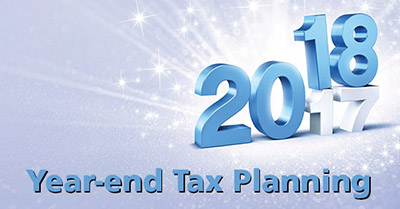
If you’re a bit behind on the news, you may have missed that there will be sweeping changes in the tax world soon. This has everyone in a panic trying to figure out how it will affect them. The truth is, right now it’s too soon to figure anything out yet because we can’t be sure what the final plan will actually contain. So let’s take a break from worrying about the future and instead focus on lowering your 2017 taxes. Consider using the strategies below to help lower your tax liability.
Establish Your 2017 Retirement Plan
Stashing away funds for retirement not only provides security for your future, but also decreases your current taxes. Make sure your retirement plan is in place by the end of the year so you can get a tax deduction for 2017.
Several retirement plans comprise contributions from both the employee and the employer. And remember, in most cases you are considered both employee and employer. So check the deadlines for when each contribution must be made for your specific retirement plan. While elections for employee contributions are usually due by year-end, you can take your time with the employer contributions as long as they are in before the tax return is filed.
You should also consider contributing to an IRA. You have until April 17, 2018 to contribute to your IRA and still have it count towards your 2017 tax year. You can put up to $5,500 in your IRA account, and if you qualify for a tax deduction that could save you well over $1,000 in taxes.
Convert to a Roth IRA
Now may be the time to consider converting your traditional IRA to a Roth IRA. You fund a Roth IRA with post-tax dollars. So you won’t receive a deduction when you contribute, but you can pull out the entire fund completely tax-free starting at age 59½. Think about it like this—if your investments grow at a rate of 5% and you won’t need your retirement fund for 25-30 years, that’s going to net you a huge bundle of tax-free income.
But before you convert to a Roth, you should know how much your tax bill will be upon conversion, to ensure you have the money on hand. Just make sure not to use your existing 401(k) or traditional IRA for the cash to pay the taxes, because that is likely to trigger both income and penalty taxes.
Make Use of the 0 Percent Tax Bracket
A single person with less than $37,650 in taxable income and married couples with less than $75,300 in taxable income pay 0 percent capital gains tax. If you give money to your parents or loved ones, and they qualify for the 0 percent tax bracket, you can use this to your advantage.
Example: You give your mother shares of stock with a fair market value of $10,000, for which you paid $1,000. Your aunt sells the stock and pays zero capital gains taxes. She now has $10,000 in after-tax cash to spend. Had you sold the stock, you would have paid taxes of up to $2,142 (23.8 percent times $9,000 gain).
Use Long-Term Losses to Offset Short-Term Gains
Examine your portfolio for stocks that you want to unload. When you sell stocks subject to short-term gains (with a tax rate as high as 43.4 percent), also sell stocks subject to long-term losses (with a tax rate up to 23.8 percent). With this, you offset the gains with the losses.
In other words, make the high taxes disappear by offsetting them with low-taxed losses, and pocket the difference.
Consider Donating Stock to Charity
You should consider donating appreciated stock to charity instead of cash. You get a big benefit at a low cost using this strategy because you deduct the fair market value of the stock, and you don’t pay taxes on the gain.
But if you could sell a stock at a loss, do not donate that loss-deduction stock to charity. Instead sell the stock first to create your tax-deductible loss and use it for your own benefit. Then give the charity the cash from the sale of the stock as your donation.
Daniel Magence, CPA, Esq. is a principal at Pristine CPA Solutions, LLC (www.pristinecpa.com). Pristine CPA Solutions offers tax and accounting services to individuals and businesses of all sizes, whether it’s tax returns, bookkeeping, payroll services or personal income budgeting. He can be reached at [email protected] or 201-326-6908 if you have any questions or comments, or are interested in using Pristine CPA’s services. Feel free to contact us for a free consultation.










